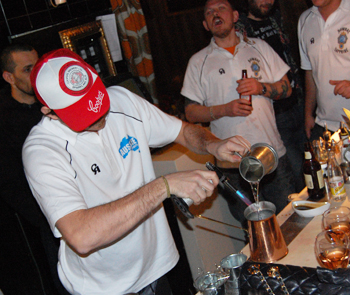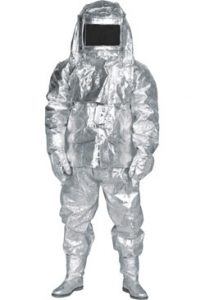First published on January 30th, 2011
BarLifeUK enlists the help of a neurologist to find out what causes ‘cocktail competition hand tremors’, and how to lessen them.
Picture the scene:

Nail this drink, and the competition sponsor will fly you to Mexico for a week. You’ve worked on the recipe for months, perfecting its balance.
You’ve made the drink 20 times at home and honed your patter to perfection.
But, as you take your place behind the bar and look at the three judges sitting opposite you, and the 50 spectators behind them, your heart starts to beat faster, your palms sweat and you just can’t keep the bar spoon still enough to measure out that critical splash of home-made artichoke and sardine bitters…
The Shakes
One thing every cocktail competition I have attended has had in common, be it a crazy, exploding molecular bash or UKBG Martini-off, is ‘The Competition Shakes’.
For the uninitiated, competition shakes are the hand tremors some bartenders get while making drinks in a competition setting.
These shakes can range in intensity from a mild waver to violent tremors, and you can be sure that at least one bartender in every competition will get them, often causing them to cock-up what could otherwise be a winning drink.
Can you hold this for me please?
 The shakes are a well-known phenomenon; everyone in the industry has either had them or seen them, and stories abound.
The shakes are a well-known phenomenon; everyone in the industry has either had them or seen them, and stories abound.
Edinburgh bartenders blame it on the shaky spoon – every bar has one, it’s just bad luck if you pick it up to make your drink.
Alex Turner of the Bacardi Brown Forman Training Team told me that while judging a competition in Manchester, he once had to measure a competitor’s ingredients for him – the bartender was shaking so badly nothing was landing in the Boston.
From personal experience I can also tell you that sitting a foot away from a bartender with a bottle of over-proof rum in one wildly shaking hand and a blowtorch in the other is pretty unnerving, to say the least.
What causes the shakes?
So what can make a bartender who regularly performs to hundreds of punters on a Friday night crack in front of three panel judges?
We enlisted the help of Doctor Edward Fathers, a consultant neurologist, who is expert in the workings of the brain and nervous system to find out. He told us:
“Everybody has a very slight tremor if you hold your hand out in front [of you]; it may be imperceptible but you can’t keep your hand completely still, and that is called a physiological tremor. We all have one to some degree or another.
There are many things that can amplify a physiological tremor – states of sleep deprivation, anxiety before an exam, standing up in front of lots of people – it is normal for the tremor to become more marked and of greater amplitude.
The reason for that is adrenalin is the hormone that we produce in states of anxiety, and it is one of the main things that influences the amplitude of a tremor. That’s why some people who get very anxious can have a higher degree of tremor.”
Be kind to yourself
It’s probably fair to assume you didn’t need a doctor to tell you that being anxious can make you shaky, but turn your attention to the ‘sleep deprived’ bit.
Nine times out of ten, a bartender will arrange their rota so that a competition falls on their day off. Stands to reason.
However, that also means the bartender is tempted to go out the night before, resulting in sleep deprivation and increasing their chances of a case of the shakes. Sound familiar?
This leads us to my next question for Dr. Fathers: “Will a hangover make the shakes worse?”
He replied: “Well, when you have a hangover you are producing more adrenalin, because of the toxins that are swashing round the body, so yes, anything that makes you feel ill will increase your adrenalin levels and amplify the tremor.”
So, the first conclusion we can draw from our time with the good doctor is that bartenders prone to the shakes, and who want to do well in a competition, should not go out the night before.
It’s purely medicinal
I then asked Dr Fathers what might help a shake-stricken bartender, and was somewhat surprised by the second part of his answer:
“There are two things that will regulate, suppress that particular type of tremor.
One is a beta blocker, which blocks the receptors that adrenalin works on… GPs will sometimes give that as a symptomatic treatment to get anxious people through interviews and exams, as and when.
The other thing that consistently works in 50% of people, if not greater, is alcohol. It is the best drug for suppressing that kind of tremor.
You don’t normally need much, normally just one or two units will suppress that sort of tremor for an hour or two.”
You heard it here first folks, straight from the NHS, a shot of Jager before you go up will most likely calm your shakes, provided you are not already so tired and hungover that the smell of it makes you faint.
That a doctor would suggest alcohol as the solution to a problem rather than the cause surprised me, so I did a little more research.
It is, in fact, an established medical fact that ethanol treats physiological tremors
A paper entitled The Effects Of Alcohol On Physiological Tremor by M. Lakie, K. Frymann, F. Villagra and P. Jakeman of Birmingham University (1993), describes tests conducted on shaky subjects by attaching accelerometers to their wrists, and feeding them booze.
They described the result: The acceleration (and consequently power) of wrist tremor decreased bilaterally in each subject after drinking alcohol.
The paper went on to say: Alcohol consumption causes a large temporary decrease in the size of physiological wrist tremor. The decrease is maximal between 30 and 60 minutes.
Indeed the evidence for alcohol’s curative effects on hand tremor is so strong, it holds ‘banned substance’ status in the Olympic sports of shooting and archery – these events being so reliant on steady hands.
I wonder if one day the UKBG, fans of propriety that they are, will ban alcohol from cocktail competitions, for fear of giving an unfair advantage to bartenders who drink…?
To conclude: drink just before, not the night before
So, armed as we are with medical science, it is safe to say that you should arrive at a cocktail competition well rested, without a hangover but with shot glass in hand if you want to escape the shakes.
We must point out however, that neither BarLifeUK nor Dr Fathers endorse the irresponsible consumption of alcohol or prescription drugs, for cocktail competition success or otherwise.
On the other hand, we fully endorse Angus Winchester’s idea that endorphins might stop the shakes and that the best way to stimulate them is to ‘pleasure oneself’ before a comp.
It’s a theory we can really get behind.


